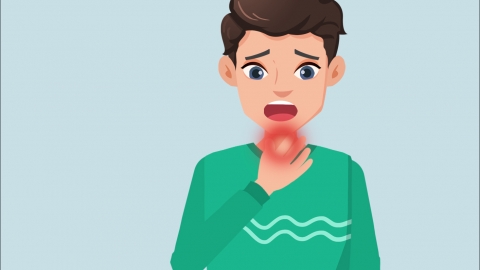What causes a hoarse throat?
Generally speaking, the throat refers to the pharynx and larynx. Hoarseness may be caused by excessive voice use, dehydration, dry environment, acute laryngitis, vocal cord polyps, and other reasons. If discomfort occurs, timely medical attention is recommended. Detailed explanations are as follows:

1. Excessive Voice Use
Speaking loudly, singing, shouting, or talking continuously for prolonged periods can cause frequent vibration and friction of the vocal cords in the throat. This may lead to congestion and edema of the vocal cord mucosa, affecting the normal vibration and sound-producing function of the vocal cords, thus causing hoarseness. It is important to schedule voice use appropriately and avoid continuous vocalization for long periods.
2. Dehydration
When the body lacks sufficient water intake, the mucous membranes in the throat become dry. The vocal cords, as important sound-producing structures in the throat, are covered with mucous membranes whose elasticity decreases in a dehydrated state, affecting their normal vibration characteristics. This may lead to incomplete vocal cord closure or abnormal vibration during phonation, resulting in hoarseness. It is important to ensure adequate daily water intake; generally, adults should drink 1500-2000 milliliters of water per day, divided into multiple servings, and avoid waiting until thirsty to drink water.
3. Dry Environment
When the ambient air is dry, the moisture in the mucous membranes of the throat easily evaporates. Dry mucous membranes reduce the lubrication of the vocal cords, increasing friction during phonation, which can lead to vocal cord fatigue and injury, ultimately causing hoarseness. A humidifier can be used to increase indoor air humidity during daily life.
4. Acute Laryngitis
Acute laryngitis is mostly caused by viral or bacterial infections, but can also be triggered by inhaling harmful gases or dust. Inflammation may lead to congestion and edema of the laryngeal mucosa, especially swelling of the vocal cord mucosa, which alters the vibration frequency and amplitude of the vocal cords, preventing normal phonation and resulting in hoarseness. It may also be accompanied by symptoms such as throat pain and cough. Treatment may include medications such as Prednisone Acetate Tablets, Huang's Phonation Pills, and Cefradine Capsules, under the guidance of a physician.
5. Vocal Cord Polyps
Vocal cord polyps often result from long-term improper voice use, excessive voice strain, or strong vocalization in a single episode, leading to submucosal hemorrhage and edema in the vocal cords, which gradually form polyps. These polyps grow on the vocal cords, disrupting their normal structure and vibration patterns, affecting sound production and transmission, and potentially causing hoarseness. Patients may also experience symptoms such as difficulty breathing. Under a physician's recommendation, patients can undergo surgical removal of the polyps, such as vocal cord polypectomy under suspension laryngoscopy.
Maintain healthy lifestyle habits in daily life, avoid smoking and alcohol consumption, and reduce irritation to the throat. Additionally, during cold seasons, wear masks to prevent upper respiratory tract infections from affecting the throat and larynx.







